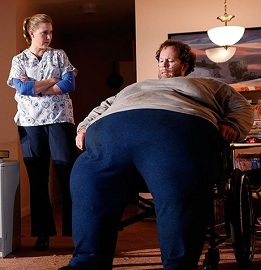
Leaving a play with the sense that you need a minute to walk off the weight of its strength is a rare and wonderful sensation. It means that the work has hit you, that its words have somehow found their way through the cracks of the protective exterior we all wear to get through the day and reached the vulnerable core where we are still capable of change. This is the place where good plays are meant to take hold, and The Whale, currently running at Playwrights Horizons, is one of these extraordinary plays. Plunging into a depth of unconventional characters adrift in a sea of uncovered territory, playwright Samuel D. Hunter has harpooned an unlikely hero and the swells of torment and love that surround him.
Shuler Hensley takes on the ample skin of Charlie, down to the sleep apnea that can only be assumed from his congested and strained breathing. Hensley embraces the confines of Charlie's limited movement, functioning in defiance of those limitations when inspired, while remaining pinned down by the tether of his obesity. Resigned to the sufferings of his enduring self-punishment, he apologizes profusely for the discomfort he causes others as his eyes beam with a well-meaning love that defies the profound hatred he harbors for himself. It is a compelling performance.
Reyna de Courcy joins in the prevailing winds of intensity and power of emotion, playing Ellie, Charlie’s estranged daughter. Ellie mirrors Charlie's pariah-like qualities, isolating herself through extroverted acts of hostility rather than concealing herself in Charlie's anticipatory tomb, and Courcy explores her seething hatred beautifully. Mining her own extreme features for Fellini-esque oddness, she captures the social awkwardness and conflicting resistance/longing of someone who considers herself far above those around her, only made worse by there being some support for such sentiments.
Cory Michael Smith holds his own in this cast of unlikely characters, beaming with the excitement of a Mormon on his mission while concealing some serious self-doubts. Tasha Lawrence makes a late appearance onstage as Mary, Charlie’s jilted ex-wife, but makes a definitive entrance, subtly explaining the other half of the genetic contribution that resulted in Ellie. As we spend more time with Ellie, meeting her first, it can be assumed that Lawrence had to at least partially craft her performance to the mold already presented by her daughter, and she does so with brilliantly restrained accents. Cassie Beck is the one actor who struggles in this cast, never quite connecting with the emotional charge that everyone else is tapped into. Beck seems like something is holding her back, keeping her trapped in her head while her cast mates are all living in their bodies.
Samuel D. Hunter is a playwright to keep an eye on. Though the setting of this play is not far from the kitchen sink that American playwrights have been drowning in for over half a century, there is a freshness and sincerity to his characters which is engaging and much welcomed. His dialog breathes with natural ease out the mouths of his actors, and his story achieves a compelling blend of tragedy and comedy. Director Davis McCallum takes an organic approach to this piece, allowing it to live in the natural lighting of Jane Cox’s fittingly stark design and the biting reality of Mimi Lien's neglected and appropriately indistinctive apartment floor plan. It is a painfully mundane world inhabited by people who are made unique by the awareness, resistance, and acceptance of how mundane they truly are. McCallum moves his actors through the mess of Charlie's deteriorating existence, managing to pull strong performances and gripping interactions from them.
With so many strong plays coming out this year, it is difficult to say which you should see if you can only take in one before New Year’s Eve brings us to 2013, but The Whale is an indisputably worthy contender, and serious aficionados of plays would be doing themselves a shameful disservice by not witnessing this production while it is with us.
